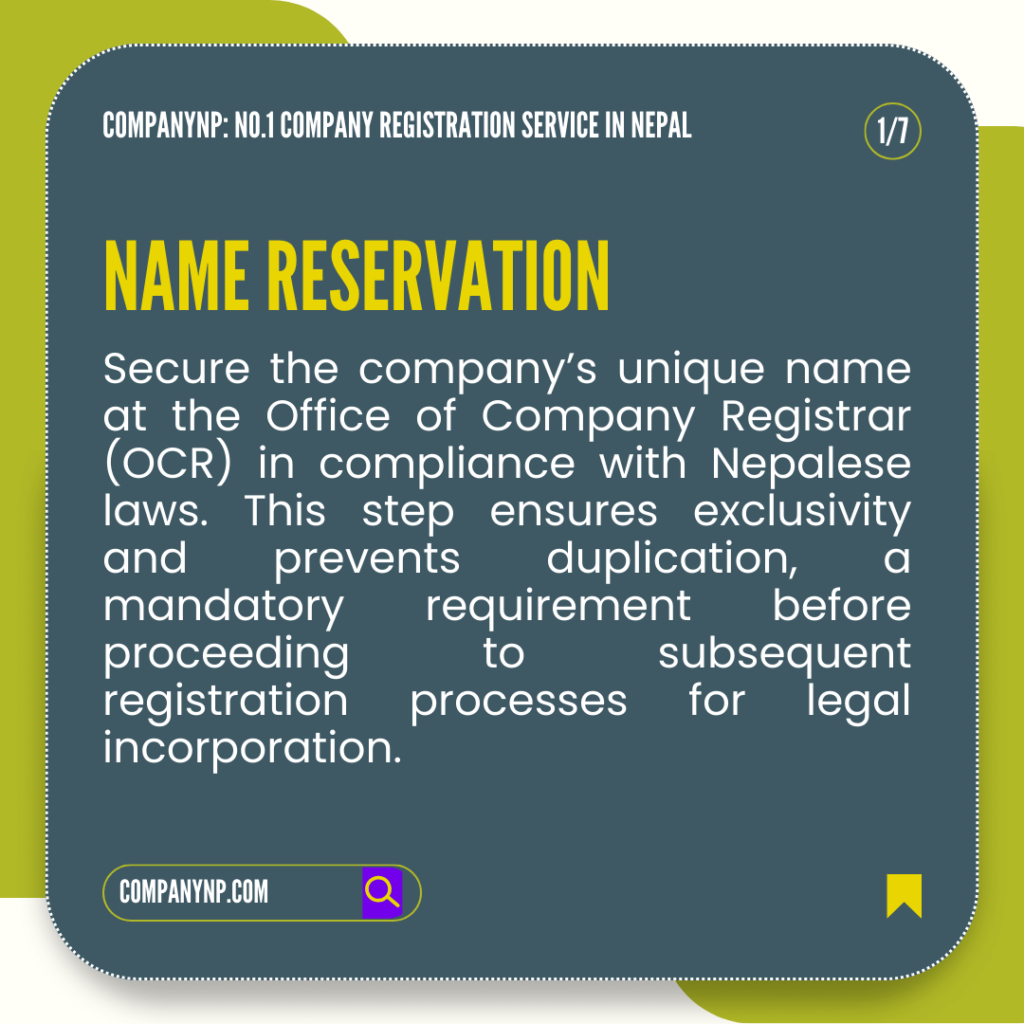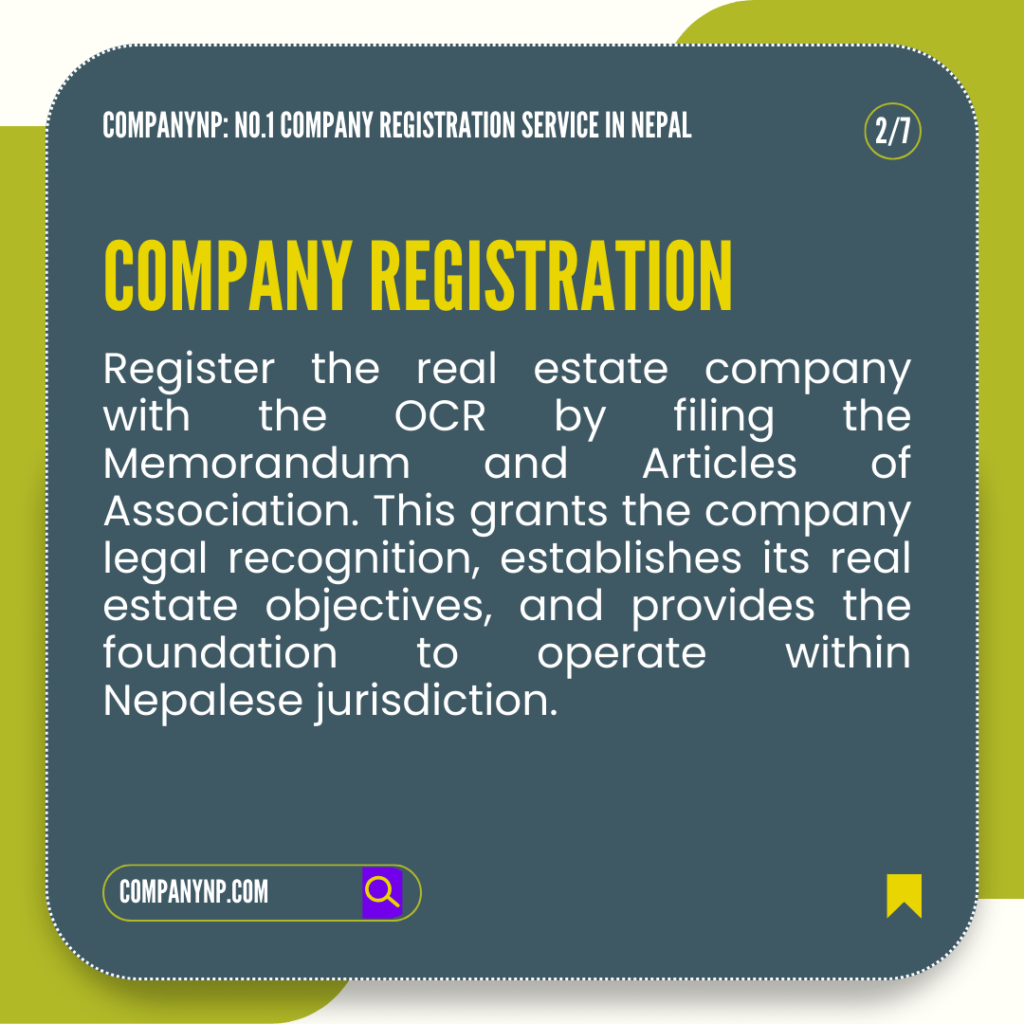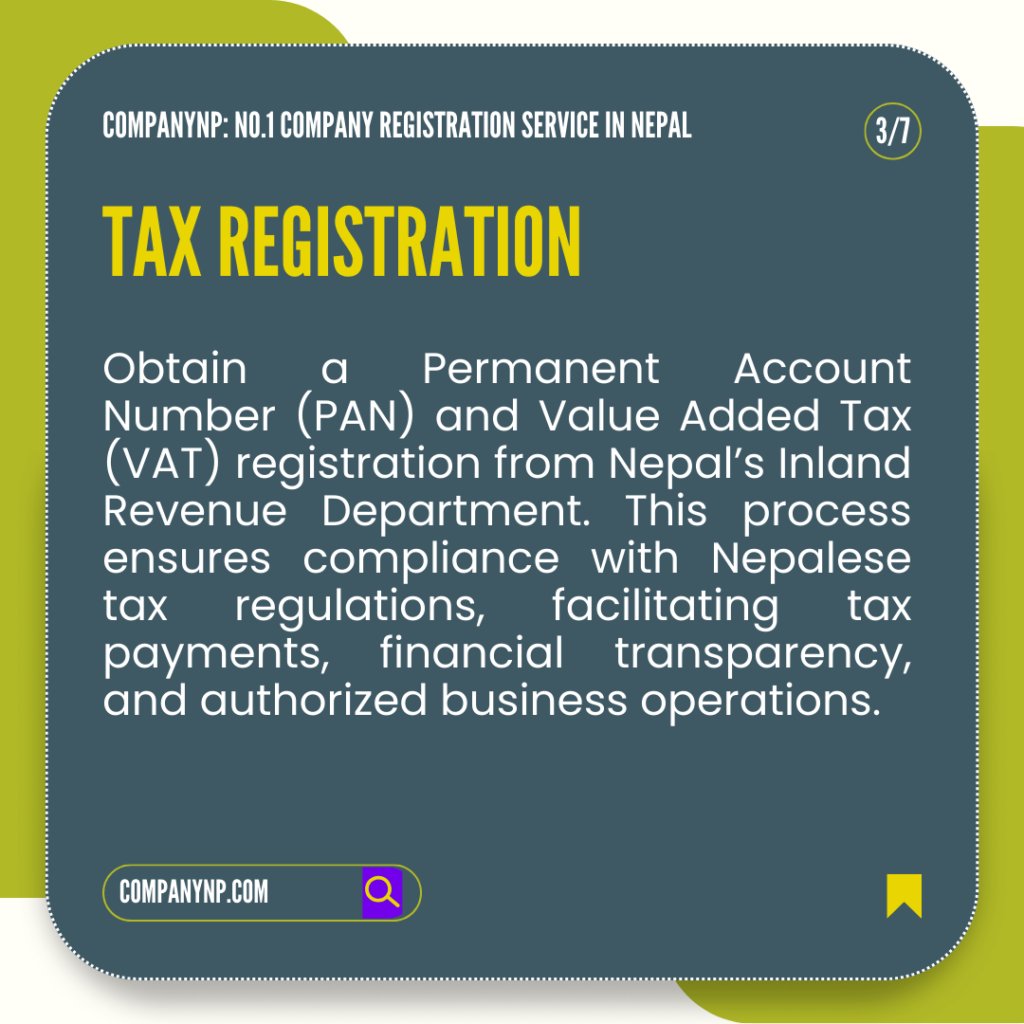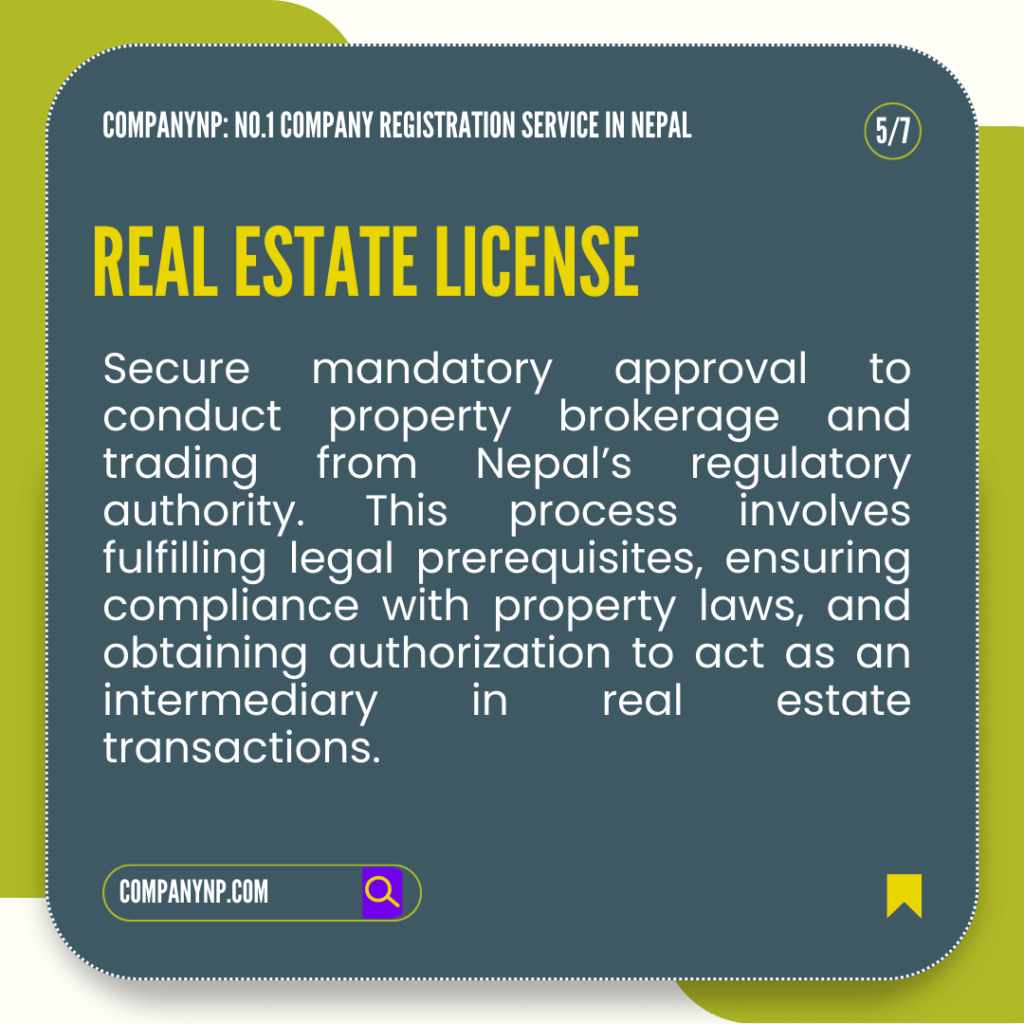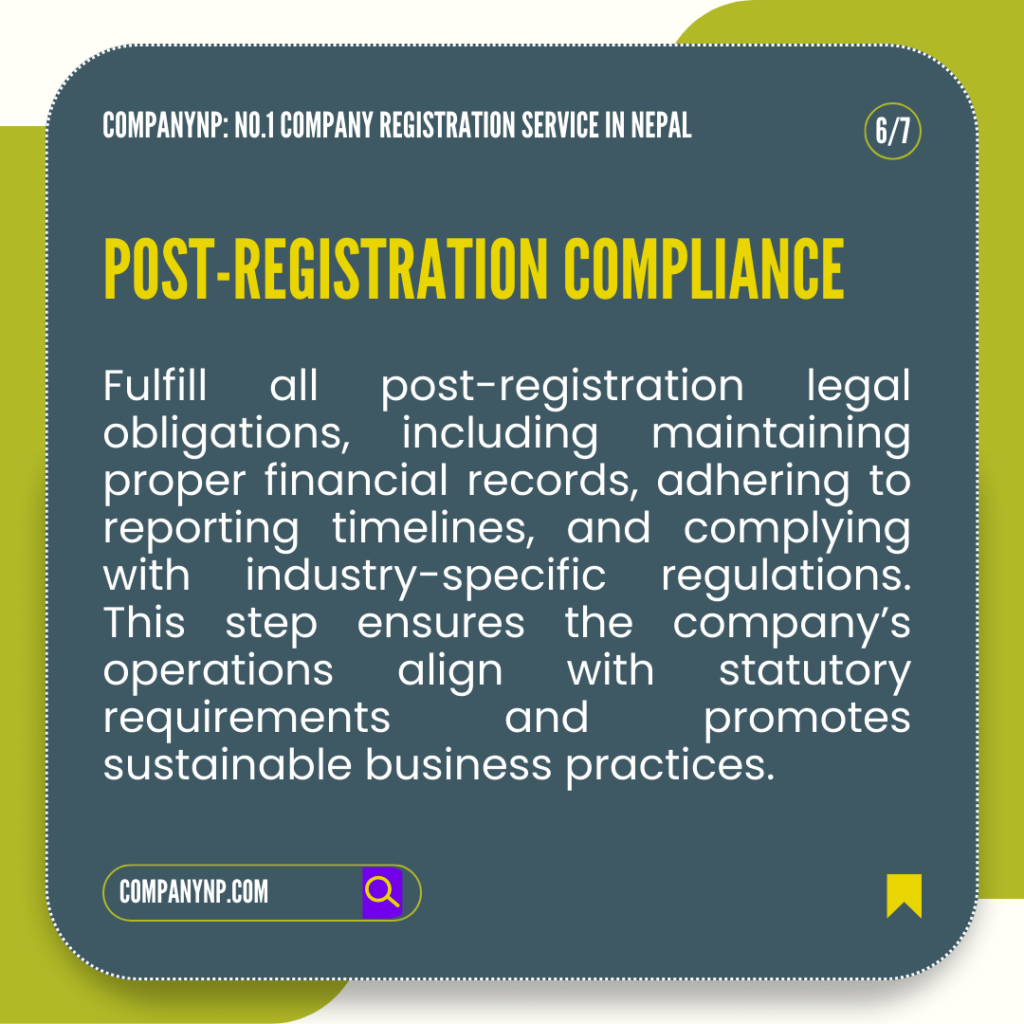This guide provides a lawyer’s insight into Real Estate Company Registration in Nepal, covering essential aspects to understand the process along with regulatory and legal compliances. It shall provide effective insights such as applicable laws, regulatory requirements, step-by-step procedures, and post-registration obligations.
What is a Real Estate Company?
A real estate company is a business entity that specializes in various aspects of the property market. These companies typically engage in activities such as:
- Buying and selling properties
- Property development and construction
- Property management and maintenance
- Real estate brokerage and agency services
- Real estate investment and financing
In Nepal, real estate companies play a vital role in urban development, housing solutions, and commercial property management. They operate under specific regulations and must comply with local laws governing property transactions and development.
Why Register a Real Estate Company in Nepal?
Registering a real estate company in Nepal offers several advantages:
- Legal recognition: A registered company gains official status, allowing it to operate legally in the Nepalese market.
- Credibility: Registration enhances trust among clients, partners, and financial institutions.
- Access to financing: Registered companies can more easily obtain loans and investments.
- Limited liability: Shareholders’ personal assets are protected from company debts.
- Tax benefits: Registered companies may be eligible for certain tax incentives.
- Growth opportunities: Official registration opens doors for expansion and partnerships.
- Compliance: Operating as a registered entity ensures adherence to local laws and regulations.
Where to Register a Real Estate Company in Nepal?
In Nepal, real estate companies are primarily registered with the following government bodies:
- Office of Company Registrar (OCR): This is the main authority for company registration in Nepal.
- Department of Land Management and Archives: For specific real estate-related permits and licenses.
- Local Municipality Office: For obtaining necessary local permits and approvals.
The primary registration process is conducted through the OCR, which falls under the Ministry of Industry, Commerce, and Supplies. It’s advisable to consult with a local legal expert or business consultant to ensure all necessary registrations are completed accurately.
How to Register Real Estate Company in Nepal?
Real Estate Company Registration process in Nepal
- Step 1: Choose a Business Structure
- Step 2: Select a Unique Company Name
- Step 3: Prepare Required Documents
- Step 4: Apply for Company Registration
- Step 5: Obtain PAN/VAT Registration
- Step 6: Start Real Estate Operations Legally
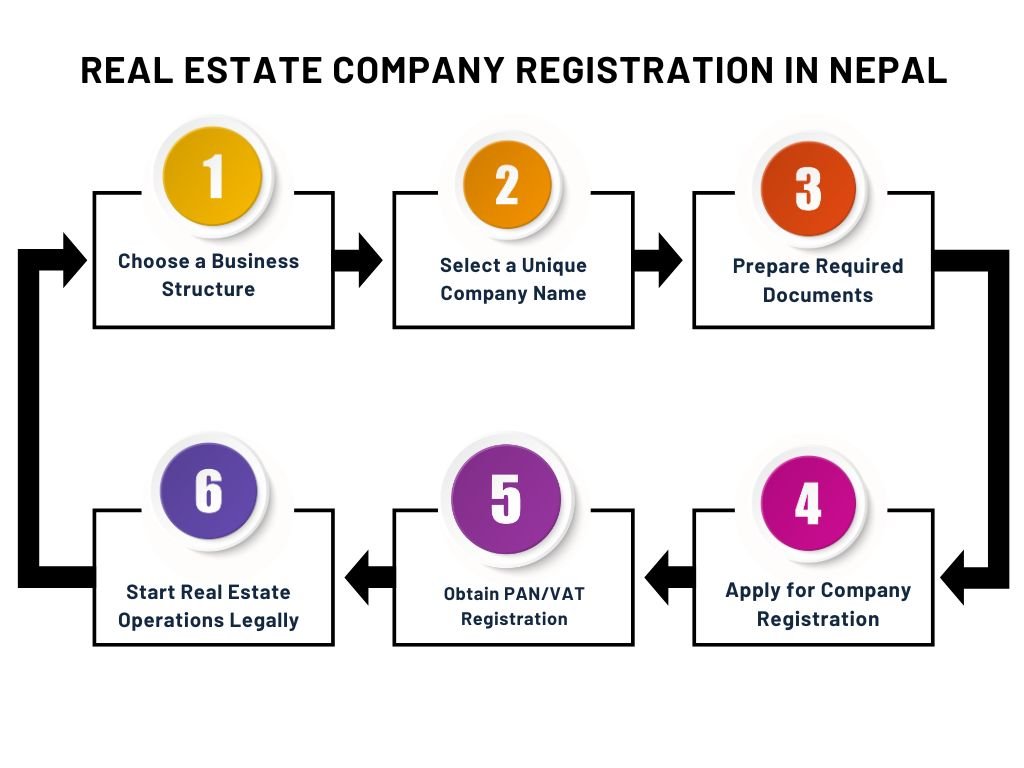
Step 1: Choose a Business Structure
- Decide whether to register as a private limited company, public limited company, or partnership.
- Most real estate businesses in Nepal prefer private limited for flexibility and ownership control.
Step 2: Select a Unique Company Name
- Choose a name that complies with Company Act guidelines.
- Ensure the name isn’t already registered by checking with the Office of the Company Registrar (OCR).
Step 3: Prepare Required Documents
- Collect documents like Memorandum and Articles of Association, citizenship copies, and address proof.
- Ensure all documents are correctly signed and notarized as required by OCR.
Step 4: Apply for Company Registration
- Submit your application along with necessary documents to OCR.
- Pay the registration fee based on your company’s proposed capital structure.
Step 5: Obtain PAN/VAT Registration
- After company registration, apply for PAN or VAT from the Inland Revenue Department.
- This is essential for legal operations, taxation, and financial transparency in Nepal.
Step 6: Start Real Estate Operations Legally
- Open a bank account in your company’s name and begin transactions.
- Make sure to comply with real estate laws and annual reporting obligations consistently.
What is the Process of Registering a Real Estate Company in Nepal?
Registering a real estate company in Nepal involves several steps:
- Name approval: Submit potential company names to the OCR for approval.
- Document preparation: Gather all required documents, including memorandum and articles of association.
- Application submission: File the registration application with the OCR along with necessary documents.
- Fee payment: Pay the required registration fees.
- Document verification: The OCR reviews and verifies submitted documents.
- Registration certificate issuance: Upon approval, the OCR issues a company registration certificate.
- Post-registration procedures: Obtain additional licenses and permits specific to real estate operations.
It’s important to note that the process may vary slightly depending on the type of real estate company (private limited, public limited, etc.) and its specific activities. Working with a local expert can help navigate these nuances effectively.
Read More:
Healthcare Company Registration in Nepal
Foreign Investment Approval Process in Nepal
Foreign Director Appointment Process in Nepal
What Documents are Needed for Real Estate Company Registration?
To register a real estate company in Nepal, you’ll need to prepare and submit the following documents:
- Company name reservation letter
- Memorandum of Association
- Articles of Association
- Consent letters from proposed directors
- Copies of citizenship certificates of promoters and directors
- Passport-sized photographs of promoters and directors
- Proposed capital structure and share allocation details
- Proof of office address (rental agreement or ownership documents)
- Resolution from foreign company (if applicable for foreign investment)
- Any other sector-specific documents required by the OCR
Ensure all documents are properly filled out, signed, and notarized as required. Accurate and complete documentation will help expedite the registration process.
How Long Does it Take to Register a Real Estate Company in Nepal?
The timeline for registering a real estate company in Nepal can vary depending on several factors:
- Complexity of the company structure
- Completeness and accuracy of submitted documents
- Current workload of the OCR
- Any additional sector-specific approvals required
On average, the process typically takes about 3-4 weeks from start to finish. However, it’s important to note that this is just an estimate. Some registrations may be completed more quickly, while others might take longer, especially if there are any issues with the application or if additional information is required.
To ensure a smooth and timely registration process:
- Prepare all documents thoroughly before submission
- Respond promptly to any queries from the OCR
- Consider working with a local business consultant or lawyer familiar with the process
Remember that after the initial registration, there may be additional time needed to obtain specific licenses and permits related to real estate operations.
What is the Cost of Registering a Real Estate Company in Nepal?
The cost of registering a real estate company in Nepal consists of several components:
- Name reservation fee: NPR 100
- Registration fee: Varies based on authorized capital
- Up to NPR 100,000: NPR 1,000
- NPR 100,001 to NPR 500,000: NPR 4,500
- NPR 500,001 to NPR 2,500,000: NPR 9,500
- NPR 2,500,001 to NPR 10,000,000: NPR 16,000
- Above NPR 10,000,000: NPR 19,000
- Stamp duty: 0.5% of the authorized capital
- Lawyer or consultant fees (if hired): Varies, typically NPR 15,000 to NPR 50,000
- Notary fees: Approximately NPR 500 to NPR 1,000
Additional costs may include:
- Sector-specific license fees
- Municipality registration fees
- PAN (Permanent Account Number) registration fee
It’s important to budget for these expenses and potential additional costs that may arise during the registration process. The total cost can vary significantly based on the company’s capital structure and specific requirements.
What are the Post-Registration Requirements for a Real Estate Company?
After successfully registering your real estate company in Nepal, there are several important post-registration requirements to fulfill:
- Tax registration: Obtain a Permanent Account Number (PAN) from the Inland Revenue Department.
- VAT registration: If annual turnover exceeds NPR 5 million, register for Value Added Tax (VAT).
- Social Security Fund (SSF) registration: Register with the SSF for employee benefits.
- Local business operating license: Obtain from the relevant municipality or rural municipality.
- Real estate specific licenses: Acquire any additional permits required for real estate operations.
- Bank account opening: Set up a corporate bank account for financial transactions.
- Annual compliance: File annual returns and audited financial statements with the OCR.
Staying compliant with these requirements is crucial for maintaining good standing and avoiding penalties. It’s advisable to set up a system for tracking and managing these ongoing obligations.
What are the Specific Requirements for Real Estate Companies in Nepal?
Real estate companies in Nepal must adhere to several specific requirements:
- Land ownership restrictions: Foreign companies face limitations on land ownership.
- Environmental compliance: Adhere to environmental regulations for construction projects.
- Building codes: Comply with national and local building codes and standards.
- LMBA registration: Register with the Land Management and Building Association for certain activities.
- Professional certifications: Employ or partner with certified real estate professionals.
- Transparent transactions: Maintain clear records of all property transactions.
- Anti-money laundering compliance: Implement measures to prevent money laundering in real estate deals.
These requirements aim to ensure ethical practices, protect consumers, and promote sustainable development in Nepal’s real estate sector.
What are the Benefits of Registering a Real Estate Company in Nepal?
Registering a real estate company in Nepal offers numerous benefits:
- Legal protection: Operate within the legal framework, reducing risks of penalties or shutdowns.
- Market credibility: Gain trust from clients, partners, and financial institutions.
- Access to financing: Easier to secure loans and investments for projects.
- Government contracts: Eligibility to bid on government real estate projects.
- Professional networks: Join industry associations and participate in official forums.
- Tax structure: Benefit from a clear tax structure and potential incentives.
- Dispute resolution: Access to legal recourse in case of business disputes.
By registering your real estate company, you position yourself for long-term success in Nepal’s growing property market. It demonstrates your commitment to professionalism and compliance, which can be a significant competitive advantage.
In conclusion, while registering a real estate company in Nepal involves several steps and requirements, the benefits far outweigh the initial effort.
How to Register a Real Estate Company in Nepal?
Step 1: Reservation of Real Estate Company Name
Step 2: Registration of Real Estate Objective Company at OCR
Step 3: Tax Registration at Inland Revenue Department
Step 4: Business Registration with Real Estate Objectives at Local Ward Office
Step 5: Obtaining Approval for Brokerage and Trading of Properties in Nepal
What documents are needed for Real Estate Company Registration?
Documents Required to register a Real Estate Business are:
1. Company Registration Letter
2. Memorandum of Association
3. Articles of Association
4. Consent letters from proposed directors
5. Copies of citizenship certificates of promoters and directors
6. Passport-sized photographs of promoters and directors
7. Proposed capital structure and share allocation details
8. Proof of office address (rental agreement or ownership documents)
How to get a Real Estate License in Nepal?
Obtain Real Estate License by following this process:
Step 1: Registration of Company at OCR
Step 2: Determining Objectives for Real Estate Company
Step 3: Tax and Local Business Registration
Step 4: Application for practicing Real Estate in Nepal
Step 5: Obtaining Real Estate License in Nepal
How much does it cost to register a real estate company in Nepal?
Registering a real estate company in Nepal costs approximately NPR 10,000 to 15,000, depending on the company’s capital and structure. Additional fees may apply for legal services and documentation.
What government authority handles real estate company registration in Nepal?
The Office of Company Registrar (OCR) under the Ministry of Industry, Commerce and Supplies oversees real estate company registration in Nepal. This authority handles all company-related matters.
How long does it take to register a real estate company in Nepal?
The process of registering a real estate company in Nepal typically takes 2-4 weeks. However, delays may occur due to documentation issues or high application volumes.
Can a foreign national register a real estate company in Nepal?
Foreign nationals can register a real estate company in Nepal, but with restrictions. They must partner with Nepali citizens and obtain approval from the Department of Industry.
Contents
- 1 What is a Real Estate Company?
- 2 Why Register a Real Estate Company in Nepal?
- 3 Where to Register a Real Estate Company in Nepal?
- 4 How to Register Real Estate Company in Nepal?
- 5 What is the Process of Registering a Real Estate Company in Nepal?
- 6 What Documents are Needed for Real Estate Company Registration?
- 7 How Long Does it Take to Register a Real Estate Company in Nepal?
- 8 What is the Cost of Registering a Real Estate Company in Nepal?
- 9 What are the Post-Registration Requirements for a Real Estate Company?
- 10 What are the Specific Requirements for Real Estate Companies in Nepal?
- 11 What are the Benefits of Registering a Real Estate Company in Nepal?


